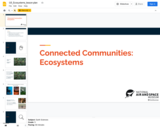
This lesson explores ecosystems and how living things are interconnected.
- Subject:
- Life Science
- Material Type:
- Lesson Plan
- Provider:
- National Air and Space Museum
- Author:
- National Air and Space Museum
- Date Added:
- 09/06/2022

This lesson explores ecosystems and how living things are interconnected.

Verifying social media posts is quickly becoming a necessary endeavor in everyday life, let alone in the world of education. Social media has moved beyond a digital world which connects with friends and family and has become a quick and easy way to access news, information, and human interest stories from around the world. As this state of media has become the "new normal," especially for our younger generations, we, educators, find ourselves charged with a new task of teaching our students how to interact with and safely consume digital information.The following three modules are designed to be used as stand-alone activities or combined as one unit, in which the lessons can be taught in any order. "Who Said What?!" is a module focusing on author verification. "A Picture is Worth a Thousand Words'' is a module devoted to image verification. "Getting the Facts Straight" is a module designed to dive into information verification. Lastly, there are assessment suggestions to be utilized after completing all three modules.

Intro to writing.

This lesson provides teachers with support for using text-dependent questions and Common Core literacy strategies to help students derive big ideas and key understandings while developing vocabulary using the text, "Tanya's Reunion." Tanya is initially thrilled to be heading early to Grandmaĺĺs Virginia family farm for a reunion, but it's not as much fun as she had imagined. When Grandma shares her memories and Tanya discovers an important artifact, Tanya embraces the farm for what was in the past and what is in the present.

Student groups continue to make their presentations, provide feedback to other students' presentations, and get evaluated on their listening skills.Key ConceptsIn this culminating event, students must present their project plan and solution to the class. The presentation allows students to explain their problem-solving plan, to communicate their reasoning, and to construct a viable argument about a mathematical problem.Students also listen to other project presentations and provide feedback to the presenters. Listeners have the opportunity to critique the mathematical reasoning of others.Goals and Learning ObjectivesPresent project to the class.Give feedback on other project presentations.Exhibit good listening skills.Reflect on the problem-solving process.
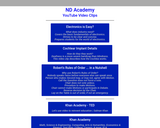
The ND Academy website (https://NDAcademy.FoxPing.com/) provides links to: 1) Electronics Is Easy? (electronic engineering), 2) Khan Academy (math, science, history, etc.), 3) Boseman Science (chemistry, physics, etc.). 4) Robert's Rules of Order in a Nutshell (efficient, professional meetings), 5) Cochlear Implants (deafness is a more severe handicap than blindness).
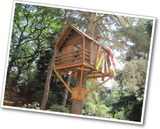
Lesson OverviewStudent groups make their presentations, provide feedback on other students’ presentations, and get evaluated on their listening skills.Key ConceptsIn this culminating event, students present their project plan and solution to the class. The presentation allows students to explain their problem-solving plan, communicate their reasoning, and construct a viable argument about a mathematical problem.Students also listen to other project presentations and provide feedback to the presenters. Listeners have the opportunity to critique the mathematical reasoning of others.GoalsPresent project to the class.Give feedback on other project presentations.Exhibit good listening skills.Reflect on the problem-solving process.

Hip hop music is a staple of music lovers around the world. With its strong, rhythmic beat and lyrical rap vocal tracks, the genre that originated in New York City after the Civil Rights Movement has grown into one of the most popular styles of music in the world.
In this lesson, students will learn about hip hop as a tool for empowerment and critically analyze its place in American history as they read, analyze, and respond to film clips and lyrics from select songs. Through the discussion questions and activities, students will question the historical complexities and come up with their own interpretation of how music can be a tool for empowerment.
Students will answer questions before, during, and after watching the clips. Teachers may choose to have students create a social post/poem/rap about a social issue or create a presentation about a song with social justice themes. The lesson also allows students to explore other songs with social justice messages, across genres.
The activities in this lesson can be implemented across curricula, including, music, history, ELA, and non-academic classes (e.g., advisory).
More About This Resource
About the Authors:
This resource was developed by PBS Digital Innovator All Star Educators. The PBS Digital Innovator All Star program brings together a community of PreK-12th grade educators, who are hometown thought-leaders and classroom changemakers, for ongoing professional learning and growth. The program creates opportunities for participants to share strategies, learn from peers and leverage PBS platforms to elevate their own ideas and voice.
PBS Digital Innovator All Stars are characterized by their ability to seamlessly integrate media and digital technology into their learning environments, inspiring students to use media and emerging technologies in responsible, effective and empowering ways.
David Upegui is a Latino immigrant who found his way out of poverty through science. He currently serves as a science teacher at his alma mater, Central Falls High School (RI) and as an adjunct professor of Education. His personal philosophy and inclusive approach to science education have enabled students to become problem-solvers and innovative thinkers. He has a keen ability to engage students in learning, exploring, and contributing to science. He received the NABT’s Outstanding Biology Teacher Award (2021) and the Evolution Education Award (2014) as well as the Presidential Award for Excellence in Mathematics and Science Teaching in 2019 (2017 cohort). Upegui started, and runs, the school's Science Olympiad team and has contributed to several publications on science education and appropriate pedagogy. He completed his doctoral degree in education at the University of RI, focusing on science education and social justice.
Darnell Williams was born on the south-side of Chicago. As a child his family traveled to different parts of the United States during his father’s service in the Navy. Williams would go on and obtain his B.A in Childhood Studies of Psychology at Rutgers University- Camden. Soon after, Williams would become an English Language Arts teacher and Social Studies teacher. In 2020 Williams would have the honor of becoming a Digital Innovator and work on several projects. During this time, Williams would also obtain his Masters in Educational Leadership. Williams would be recognized for his educational leadership during the Covid-19 pandemic. He is currently the Supervisor of Pupil Services in Hamilton Township School District in Mays Landing, New Jersey. Williams in dedicated to serving staff and students in mental health and equity.
Sensitive: This resource contains material that may be sensitive for some students. Teachers should exercise discretion in evaluating whether this resource is suitable for their class.

This module is designed for 3rd through 5th graders to explore their names, identity, immigration and cultural lore to find heroic moments in their family history. Using Icelandic immigration, both historical and current, as a model to explore: the meaning and uses of names, the difficulties of language, belonging and identity, and historical storytelling through "Egil's Saga", the student creates a personal definition of a hero. After learning basic interview techniques, the module includes interviewing a family member and identifying a heroic moment to portray through a student created comic. A gallery of comics is displayed for the community viewing including artists statements.

This lesson provides teachers with support for using text-dependent questions and Common Core literacy strategies to help students derive big ideas and key understandings while developing vocabulary using the nonfiction informational text, Wildfires. Wildfires can cause damage but also play a critical role in the renewal of forests and grasslands. Through the example of the 1988 Yellowstone fire, Wildfires highlights the effects and cycles of fires and shows the reader how critical fire is to regenerating forests and grasslands.

This lesson provides teachers with support for using text-dependent questions to help students derive big ideas and key understandings while developing vocabulary using the children's novel, Charlotte's Web. A story of friendship and loyalty between Wilbur, a spring pic and a grey spider named Charlotte. Wilbur learns that he is being fattened for slaughter in the fall. Wilbur is at first disgusted by the fact that charlotte eats flies, but comes to both appreciate and love her.

This lesson provides teachers with support for using text-dependent questions and Common Core literacy strategies to help students derive big ideas and key understandings while developing vocabulary using the text "Happy Birthday Dr. King". When ten-year old Jamalĺĺs grandfather hears that the boy is in trouble for fighting to sit in the back of the bus, he tells Jamal about Rosa Parks, Martin Luther King, Jr., and the civil rights movement. Jamal responds with an idea for a skit for his schoolĺĺs King Day assembly.
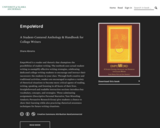
A Student-Centered Anthology & Handbook for College Writers
Short Description:
EmpoWord is a reader and rhetoric that champions the possibilities of student writing. The textbook uses actual student writing to exemplify effective writing strategies, celebrating dedicated college writing students to encourage and instruct their successors: the students in your class. Through both creative and traditional activities, readers are encouraged to explore a variety of rhetorical situations to become more critical agents of reading, writing, speaking, and listening in all facets of their lives. Straightforward and readable instruction sections introduce key vocabulary, concepts, and strategies. Three culminating assignments (Descriptive Personal Narrative; Text-Wrestling Analysis; Persuasive Research Essay) give students a chance to show their learning while also practicing rhetorical awareness techniques for future writing situations.
Long Description:
EmpoWord is a reader and rhetoric that champions the possibilities of student writing. The textbook uses actual student writing to exemplify effective writing strategies, celebrating dedicated college writing students to encourage and instruct their successors: the students in your class. Through both creative and traditional activities, readers are encouraged to explore a variety of rhetorical situations to become more critical agents of reading, writing, speaking, and listening in all facets of their lives. Straightforward and readable instruction sections introduce key vocabulary, concepts, and strategies. Three culminating assignments (Descriptive Personal Narrative; Text-Wrestling Analysis; Persuasive Research Essay) give students a chance to show their learning while also practicing rhetorical awareness techniques for future writing situations.
Word Count: 139371
(Note: This resource's metadata has been created automatically by reformatting and/or combining the information that the author initially provided as part of a bulk import process.)
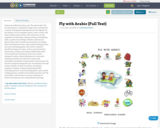
Authored by Belal Joundeya, the "Fly with Arabic" full text document is comprised of eight units, and features a variety of language-learning lessons tied together by fun themes, such as weather, sports, travel, school, and other hobbies and activities. The units focus on the acquisition of listening, reading, writing, and speaking skills, as well as knowledge of Arabic cultures and history.
Most units contain several lessons, including fill-in-the-blank exercises, open-ended writing practice, and word-matching games, that seek to reinforce specific learning outcomes, such as oral and written production, writing, and reading. Additionally, brief cultural drills are included in each unit, and are designed to add a cultural dimension to each unit's language activities. All units also contain self- assessment checklists to help monitor and measure the learner's progress during the unit.
In summary, through using a number of drills to produce vocabulary, grammar, reading, writing, and speaking skills, including pictures, word-matching games, open-ended writing practice, and fill-in-the-blank exercises, the "Fly with Arabic" series seeks to connect all phases of Arabic-learning into one comprehensive package.
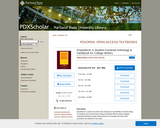
EmpoWord is a reader and rhetoric that champions the possibilities of student writing. The textbook uses actual student writing to exemplify effective writing strategies, celebrating dedicated college writing students to encourage and instruct their successors: the students in your class. Through both creative and traditional activities, readers are encouraged to explore a variety of rhetorical situations to become more critical agents of reading, writing, speaking, and listening in all facets of their lives. Straightforward and readable instruction sections introduce key vocabulary, concepts, and strategies. Three culminating assignments (Descriptive Personal Narrative; Text-Wrestling Analysis; Persuasive Research Essay) give students a chance to show their learning while also practicing rhetorical awareness techniques for future writing situations.
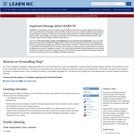
This unit is designed to appeal to adolescents with its non-print text base, the movie "Groundhog Day". The pre-viewing activities prepare students for the allusions in the movie and include cultural literacy. The teacher can pick and choose from the activities to apply the concept of personal growth. The teacher may select from activities for science, workplace ethics, music, computer competency, and English language arts. The teacher may modify any of the attachments to suit the students' needs and interests. Students will: demonstrate accurate analysis of audience through appropriate choices in diction, motive support, point support, and non-print textual support; demonstrate knowledge of the concept of character qualities and reflect positive values. The content of the presentation must be persuasive and make connections between literary elements (plot development and dynamic characterization) and another discipline (psychology, science, vocational arts, or music).
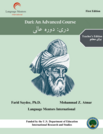
The Advanced Teacher’s Edition from our series of Dari textbooks provides an in-depth guide for teaching Dari to adults, using a proficiency-based learning model. It arms teachers with exhaustive instructions for imparting essential language skills: speaking, writing, listening, and reading, enriched with relevant exercises, step-by-step guidance, and answer keys. Targeted at students reaching ACTFL's Intermediate High or ILR levels 1+/2, the edition emphasizes critical thinking and incorporates instructional strategies like Bloom's Taxonomy for fostering intellectual growth. Featuring interactive activities in PDF and EPUB formats accessible through the LMI website (languagementors.org), this edition makes Dari education captivating and productive.

Student groups make their presentations, provide feedback for other students' presentations, and get evaluated on their listening skills.Key ConceptsIn this culminating event, students must present their project plan and solution to the class. The presentation allows students to explain their problem-solving plan, to communicate their reasoning, and to construct a viable argument about a mathematical problem. Students also listen to other project presentations and provide feedback to the presenters. Listeners have the opportunity to critique the mathematical reasoning of others.Goals and Learning ObjectivesPresent project to the class.Give feedback on other project presentations.Exhibit good listening skills.Reflect on the problem-solving and project development processes.

Student groups continue to make their presentations, provide feedback for other students’ presentations, and get evaluated on their listening skills.Key ConceptsIn this culminating event, students continue presenting their project plan and solution to the class. The presentation allows students to explain their problem-solving plan, to communicate their reasoning, and to construct a viable argument about a mathematical problem. Students also listen to other project presentations and provide feedback to the presenters. Listeners have the opportunity to critique the mathematical reasoning of others.Goals and Learning ObjectivesPresent project to the class.Give feedback on other project presentations.Exhibit good listening skills.Reflect on the problem-solving process.
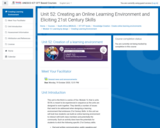
This unit is the third in a series of five. Module 12, that is units 50-54, is meant to be experienced in sequence as the units are designed to work together. They identify a number of issues that need to be addressed when designing a learning environment that embraces 21st Century Skills. In this unit we will look how students can build an online learning environment to interact with both class members and potentially the community. Such an activity does have the potentials for students to elicit the following specific 21st Century skills:
Oral and written communication, public speaking and presenting, listening;
Leadership, teamwork, collaboration, cooperation, facility in using virtual workspaces;
Information and communication technology (ICT) literacy, media and internet literacy, data interpretation and analysis, computer programming